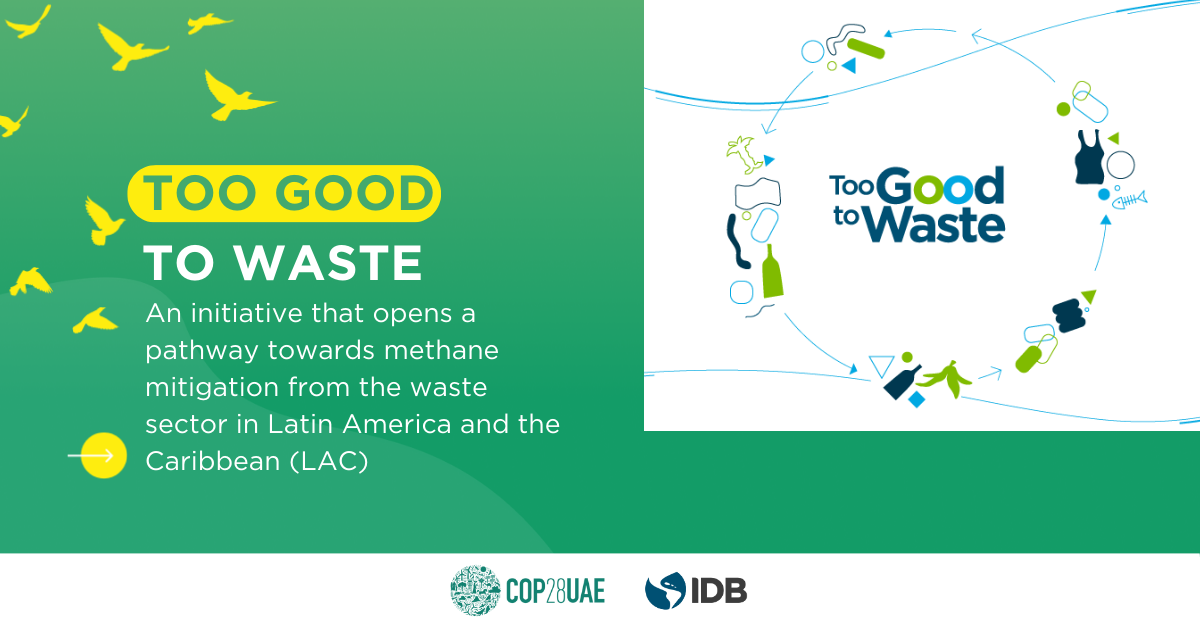By Sergio Campos, Magda Correal, and Carolina Piamonte from the Inter-American Development Bank (IDB).
The Global Methane Hub (GMH) and the AquaFund of the IDB launched the Too good to waste initiative during the LAC Climate Week in October 2023. This initiative aims to mitigate the associated methane emissions through the implementation of solid waste management projects based on a circular economy approach in LAC contributing to the Global Methane Pledge for a reduction of at least 30% of methane emissions. The completion of the pledge is vital, as mitigating methane emissions has been highlighted as the main solution to avoid the 1.5ºC increase in temperature by 2030. Solid waste and wastewater management is the third sector responsible for methane emissions generation worldwide (20%), after agriculture (40%) and fossil fuel (35%). In waste management, methane is produced due to the growing generation of waste, mostly organic waste from food loss and waste; inadequate solid waste management, lack of differentiated management, uncontrolled burning, inadequate final disposal, the disposal of organic fraction in landfills and the lack of biogas extraction in these sites.
The LAC region generated 230M tons of municipal solid waste in 2021, equivalent to approximately 13% of global waste. According to the Solid Waste and Circular Economy Hub, more than 40% of the region’s municipal solid waste was sent to inadequate disposal sites, burned or left in bodies of water. Forty-five percent of municipal solid waste, including organics, was disposed of in sanitary landfills (many of them without active biogas capture systems) and only 4% was recycled. The waste sector in LAC released more than 345 million tons of GHGs -mainly methane- into the atmosphere. Several studies using satellite technology show that methane emissions at the urban level are between 1.4 and 2.6 times higher than the levels recorded in national emissions inventories, and final disposal sites account for up to 50%. Too Good to Waste finances the structuring of bankable projects with results in methane reduction, the development of financial instruments, the monitoring and verification of methane emissions mitigation, as well as knowledge dissemination and capacity building.
In order to dramatically accelerate the Global Methane Pledge during COP28 the Partnership Lowering Organic Waste Methane (LOW-Methane Partnership) will be launched this December 2 with ambitious commitments to cut methane from the organic waste and mobilizing resources to support these commitments. The IDB, through the Too Good to Waste Initiative, is contributing to LOW Methane as the leading financial institution in LAC for the waste sector and its commitment to reducing GHG emissions. It includes three recently approved projects totaling US$ 372.5 million that include measurable results in terms of greenhouse gases (GHG) emission with emphasis on methane mitigation.
In Argentina, the Program for the integral management of urban solid waste II (AR-L1342) approved in 2022 ($US 137.5M) included in the project results, the number of environmental centers financed by the program with a GHG avoided. The program is financed by the IDB’s ordinary capital ($US70M), the European Investment Bank ($€ 40M), and local counterpart ($US 17.5M). This operation, that will benefit over 850 thousand people and handle over 270 thousand tons per year. It is the first individual project of the conditional credit line for investment projects for integrated management of urban solid waste (AR-O0018).
In the Dominican Republic, the Greater Santo Domingo solid waste management program (DR-L1156) approved in 2022 ($US 110M) included in the projects results, the tons of CO2 equivalent reduced as a result of the closure of informal open-air dumpsites and the closure of the Duquesa uncontrolled sanitary landfill, the fifth largest in the world. The mitigation estimated is 140.000 tons of CO2 per year, mainly methane. The program is financed by IDB’s (US$45 M), the Japan International Cooperation Agency JICA (US$45M), and the Spanish Agency for International Development Cooperation AECID (US$20M).
In Ecuador, the Water and sanitation investment program (EC-L1283) approved in 2023 (US$125M) will measure the program-financed interventions that avoided at least 10% of methane emissions through waste valorization and biogas capture, with a goal of 50% of the interventions. This project will finance municipal solid waste projects for US$ 17.3M from the IDB’s ordinary capital and local counterpart.
The waste sector at the COP 28 and IDB’s Too Good to Waste leading role
During COP28 in Dubai from November 30th to 12 of December of 2023, the IDB’s commitment to the Paris Agreement and the need of further create synergies with all actors for wider results in the waste sector will be enhanced. Firstly, during the Subnational Climate Action Leaders Exchange (SCALE) and the launch of LOW-Methane partnership, to be held Saturday December 2 at 13:30 local time, in which IDB President Ilan Goldfajn will join the opening remarks alongside John Kerry U.S Special Presidential Envoy for Climate, Ani Dasgupta President of the World Resources Institute and Maroš Šefčovič Vice-president of the European Commission. Secondly, the Too Good to Waste initiative will be showcased by Graham Watkins, IDB Division Chief of Climate Change, in the first Waste and Resources Pavilion hosted by the International Waste Association (ISWA) and the GMH, as part of the event Financing waste sector´s climate solutions: innovative solutions, on Monday December 4 at 14:00 local time. For those attending the COP28, the IDB invites you to attend both events and to visit the IDB Group Pavilion.


Leave a Reply